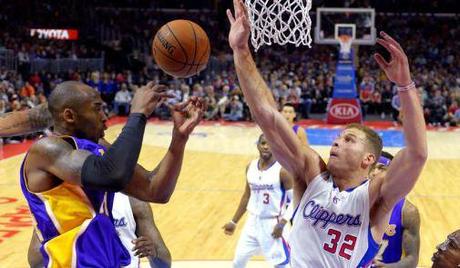
Image from http://www.trbimg.com
Speaking out against the democratic process is not a popular road to travel down in the United States. Democracy itself is built upon the idea that a majority of individuals can make wise decisions that favor the country as a whole. This article is not meant to turn the concept of American democracy on its head. In fact, this post deals with one of the biggest entertainment sources in the United States: The NBA.
The primary outlet for NBA fan input lies in the All-Star selection process. This year, the process was altered in order to give a more extensive choice of candidates. Previous years had only allowed NBA fans to vote based on a predetermined selection of players from each team. This year, all players were available for NBA enthusiasts to back.
Each set of NBA All-Star squads has the potential to inspire controversy from the snubbed. This year’s biggest snub was Damian Lillard, who plays for the Portland Trailblazers. Some other notable pass ups include Mike Conley and Kyle Korver. All in all, this year’s squad, even those selected by the fans themselves, were not bad. Anthony Davis (24.6 ppg, 10.5 rpg, 2.8 bpg) and Stephen Curry (23 ppg, 8.1 apg, 4.7 rpg) were voted into the Western Conference lineup after spectacular years. In the East, Lebron James (26.2 ppg, 7.4 apg, 5.5 rpg) and Kyle Lowry (19 ppg, 7.3 apg, 4.8 rpg) were voted in as starters alongside Carmelo Anthony, Pau Gasol, and John Wall.
Most of these players have solid cases for stardom backing them. One could argue that anyone who makes a name for themselves in the NBA has a skill higher than the average player. Nonetheless, certain players can levy their reputations and social media to win a spot that may not be theirs by merit. The NBA All-Star Game’s history has featured some questionable and, at times, bad decisions. Yao Ming stands out for his 2011 induction, considered by Complex .com to be the worst All-Star selection of all time (Diaz) due to only having played five games in the season because of injury. His stats (10.2 ppg, 5.4 rpg, 1.6 bpg) at the time did not justify a spot among the West’s best and brightest either. In comparison, Utah’s center Al Jefferson boasted 18.6 ppg, 9.7 rpg, and 1.9 bpg that year. Kevin Love, who ultimately replaced Yao Ming in the All-Star Game, averaged 20.2 ppg, 15.2 rpg, and 0.4 bpg.
This year, the major issue born from fan voting lies with the induction of Kobe Bryant. The future HOFer, while maintaining good stats (22.3 ppg, 5.6 apg, 5.7 rpg), has not been efficient or healthy (to be fair, Kobe’s season-ending injury came on January 21st, the day before the All Star squads were announced). Through 35 games, Bryant has averaged 38% in field goals and 29% from the arc. Damian Lillard has averaged similar statistics through 48 games (21.6 ppg, 6.3 apg, and 4.6 rpg) with greater accuracy at 43% and 35% respectively. In terms of shooting guards, Klay Thompson (22.7 ppg, 3 apg, 3.6 rpg), who has since been named as an All Star bench warmer, is a good fit though his ability to rebound and pass are lower than Bryant’s. James Harden (27 ppg, 6.8 apg, 5.6 rpg) is another player who would have been a better choice as a starter though his flopping certainly raises questions of its own. Harden was another player who was eventually brought onto the team by the coaches when the fans couldn’t muster enough love for him in their hearts.
All this being said, Kobe Bryant is not a bad player. He tries hard game in and game out to bring success to a struggling Laker team. The problem here is that he is neither the best guard or shooting guard to accompany Curry as a starter. In his earlier years, the Western Conference All-Star lineup would be built around Black Mamba. Nonetheless, the sun eventually sets on all NBA successes. This year is neither Kobe’s or the Los Angeles Lakers’ in terms of dominance.
The example of Kobe Bryant and Yao Ming, both players who earned their reputations through sweat and effort, is complimented by that of Jeremy Lin. The Taiwanese-American “Linsanity” has never been an All Star. His odds diminish more as Linsanity begins to die down. Nonetheless, Lin finished fourth in voting for Western guards in 2014. To put things in perspective, James Harden was fifth, Russell Westbrook was sixth, Damian Lillard was seventh, and Tony Parker was eighth. During that year, Lin averaged 12.5 ppg, 4.1 apg, and 2.6 rpg. In contrast, Westbrook averaged 21.8 ppg, 6.9 apg, and 5.7 rpg. Lillard leveled out at 20.7 ppg, 5.6 apg, and 3.5 rpg. See a pattern?
Fan participation in choosing the year’s best players is problematic. While coaches don’t necessarily have infallible judgment either, they typically go beyond a player’s popularity and assess the skill level at which a player operates. Resultantly, Lin was not chosen by the coaches in 2014 and, instead, Lillard, Harden, Paul, and Parker were the guards on the bench. Recently, fan participation in NBA All Star voting has been low as well. Only five players garnered a million or more votes in this year’s selection (MacMahon). With the low turnout rate and the errors in judgment from fans, the NBA should consider dumping the fan voting process and placing the ability to choose the East and West squads in the hands of the coaches.

